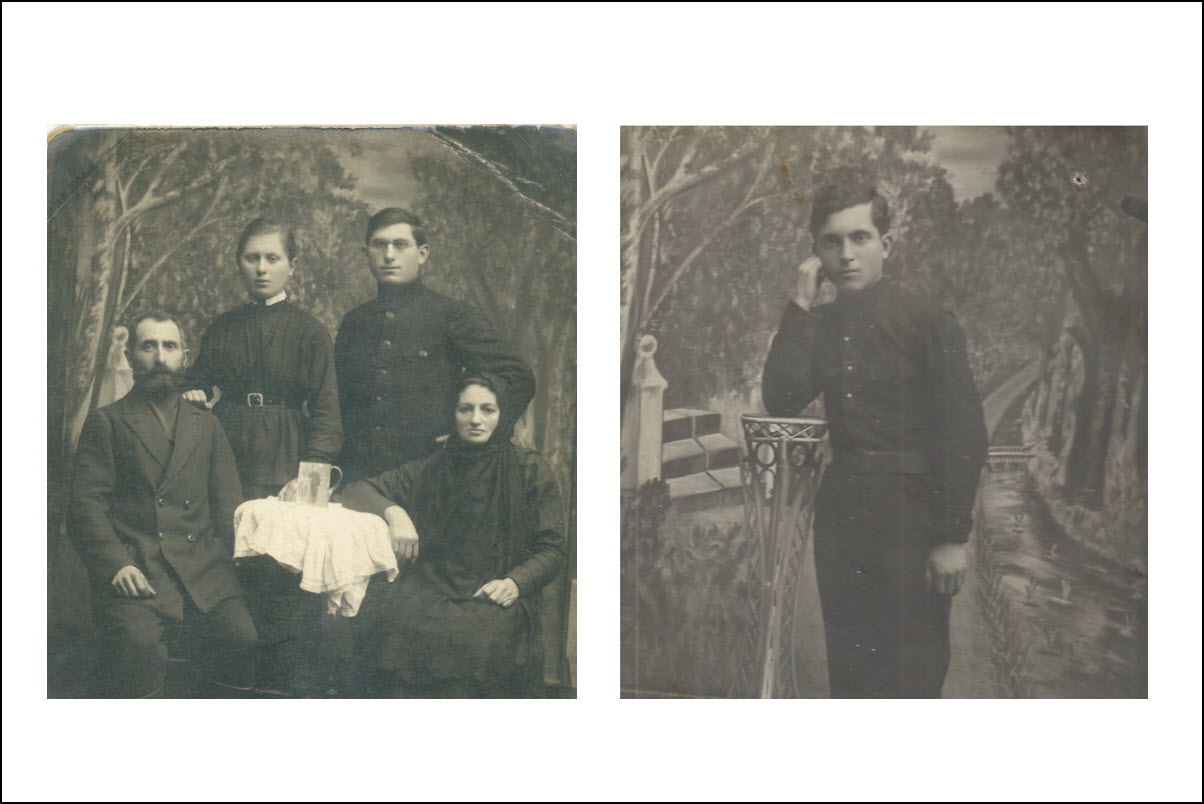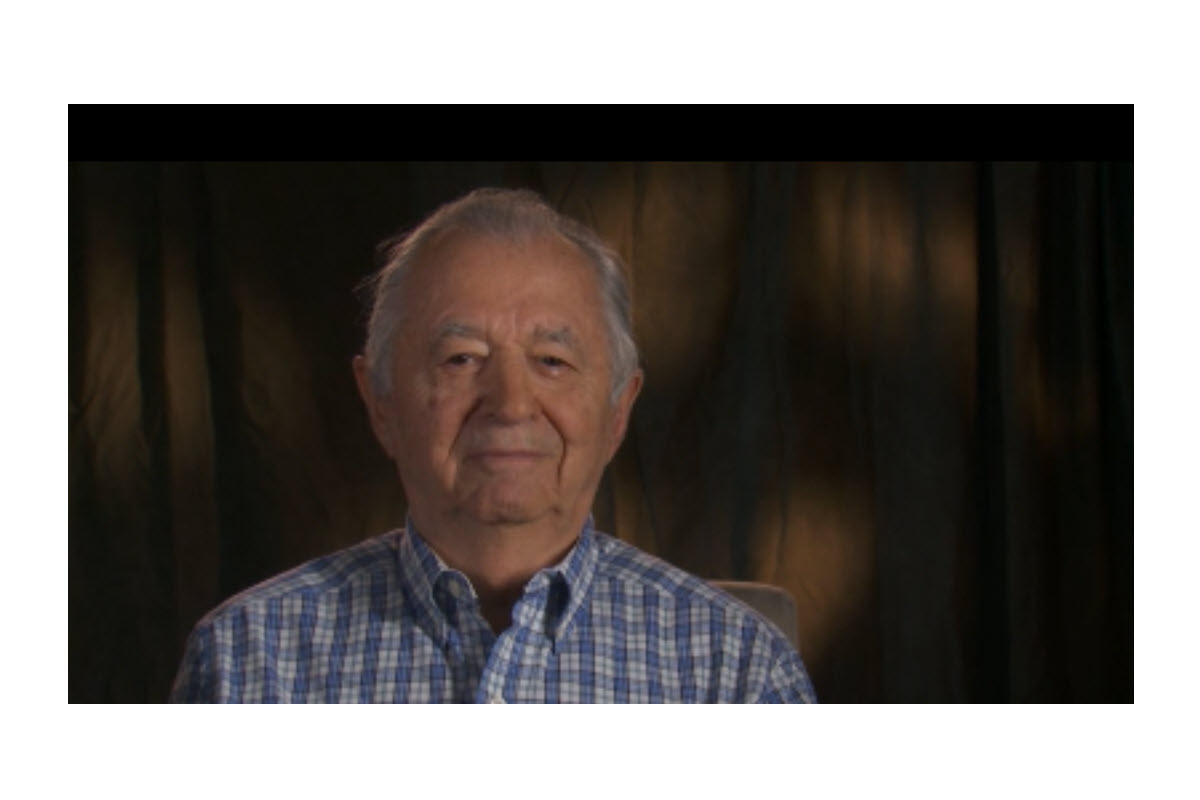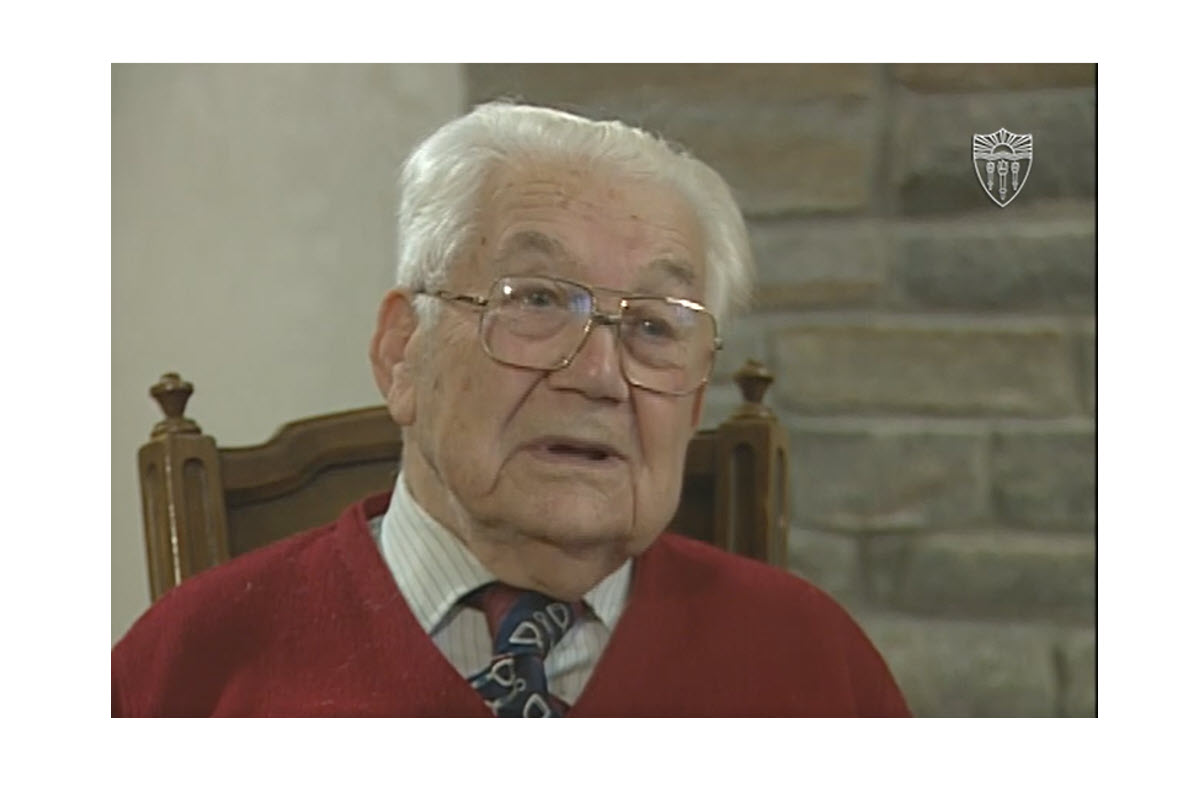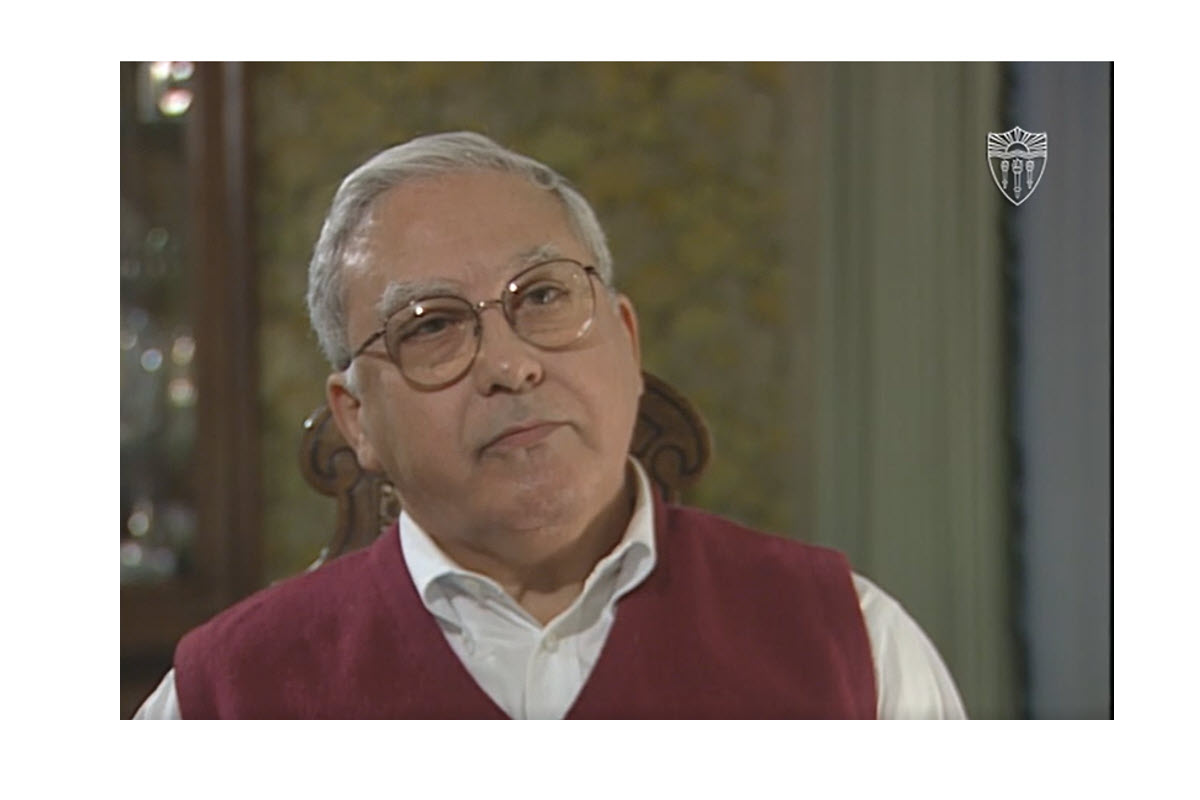-
Home
Home About Network
- History
Nostalgia and Memory The Polish Period I The Russian Period I WWI Interwar Poland 1944 Memorial Commemoration- People
Famous Descendants Families from Mlynov Migration of a Shtetl Ancestors By Birthdates- Memories
Interviews Memories 1935 Home Movie in Mlynov 1944 Memorial Commemoration Commemoration Wall- Other Resources
Our Shtetl
There is nothing like hearing reflections on Mlynov and Mervits in the voices of those who once lived there or who heard stories from those who had. The "teaser" above is a medley of such reflections. Below is collection of earlier interviews and clips from those who were born in Mlynov but immigrated to the United States before WWII or who survived the Holocaust.

***
David "Sonny" Goldseker speaking about Mlynov
David "Sonny" Goldseker interview. Courtesy of Rich Polt.In this short video clip from a longer interview, David "Sonny" Goldseker, speaks about Mlynov and his family.
"Sonny" Goldseker was born in Mlynov in 1904 to Shiman and Anna (Fishman) Goldseker, in the period when a wave of pogroms began in Kishinev in 1903 and just a year before the first Russian Revolution in 1905 which actually reached Mlynov.
He was the next to the youngest of eight children. The Goldsekers were a large well-to-do family in Mlynov. Sonny's oldest sister, Chaya (Ida Goldseker) Fishman, left Mlynov and followed her husband (and uncle) Meyer Fishman to Baltimore in January 1912. Sonny was eight years old at the time. His older brother, Morris Goldseker, left for Baltimore that same year. In 1914, his mother Anna passed away and his sister Eta stepped into the role of mothering him and his youngest brother.
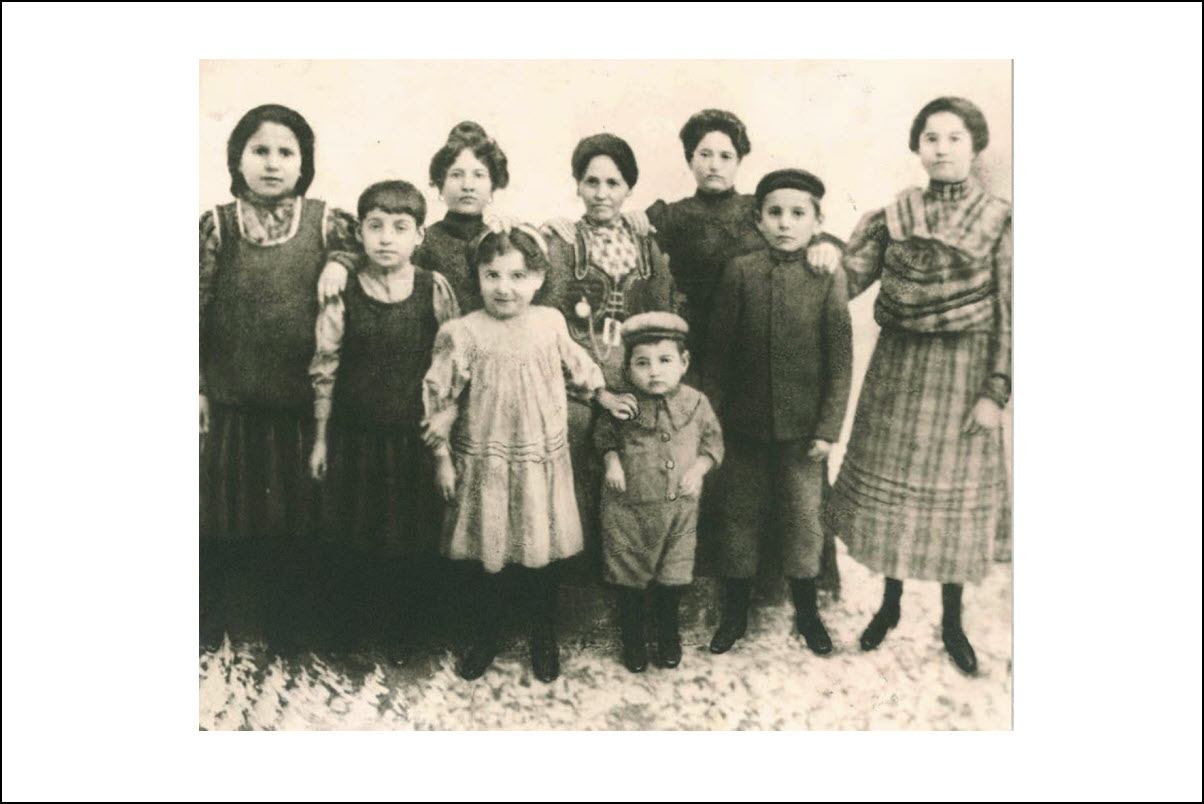 Sonny as a young boy, center front and family.[1] Courtesy of Audrey Goldseker Polt.
Sonny as a young boy, center front and family.[1] Courtesy of Audrey Goldseker Polt.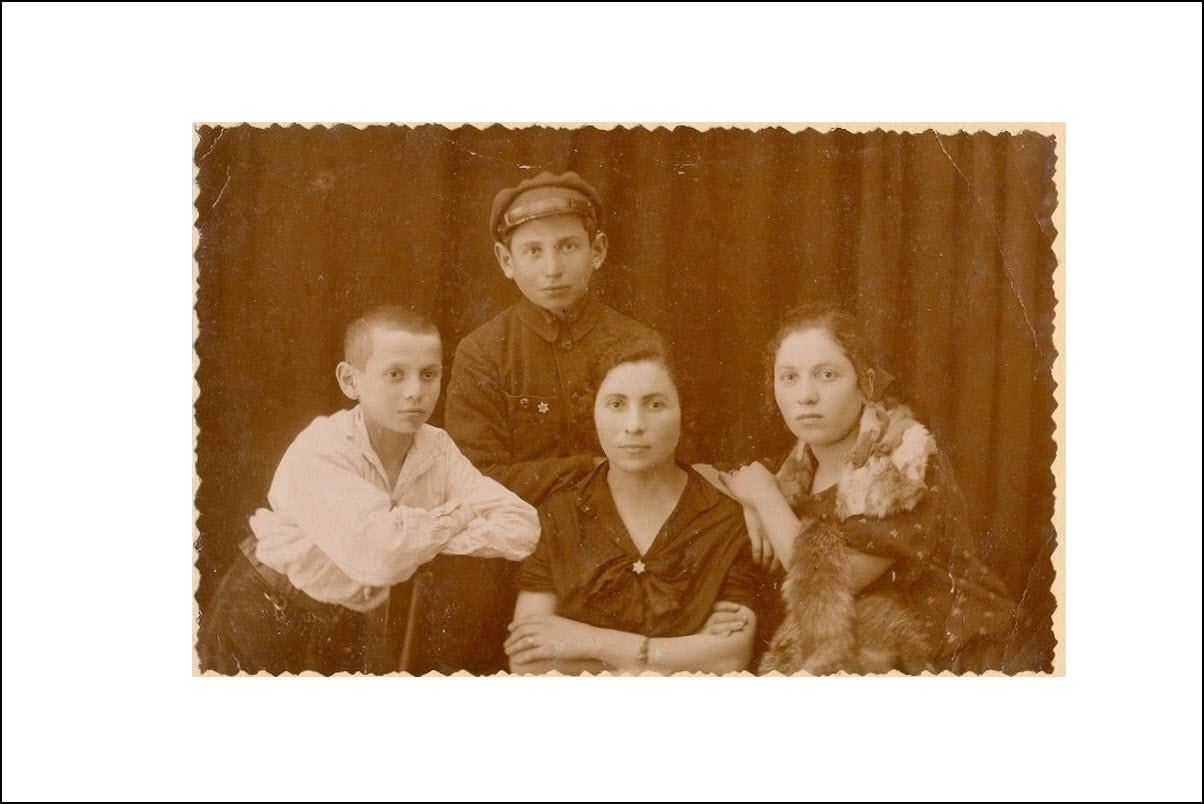 Sonny as a young boy, standing in back, with siblings (l to right): Chuna, Eta, Charna. Courtesy of Audrey Goldseker Polt.
Sonny as a young boy, standing in back, with siblings (l to right): Chuna, Eta, Charna. Courtesy of Audrey Goldseker Polt.It wasn't until 1923, after the war had ended, that Sonny was old enough to decide his own future and tearfully took leave of his father, and two siblings, and left Mlynov and headed for the United States. Because of tightening immigration quotas in the US at the time, it took Sonny three years before he arrived in Baltimore via a perilous journey to Uruquay and then a lengthy stay in Buenos Aires with other friends from Mlynov. His daughter, Audrey Goldseker Polt, recounts the story of Sam's extraordinary journey.
Notes
[1] The Family of Shimon and Anna (Fishman) Goldseker, 1906. Back row ( left to right): Eta, Ida, mother Anna, Cousin Gittel, Pearl. Front row (left to right): Bayla, Charna, Sonny (David). The youngest son, Chuna, is not yet born.
Additional Information
Read more of the Goldseker family story.
***
Benjamin Fishman Reflects on Photos from Mlynov
Ben Fishman reflects on life in Mlynov. Courtesy of Saul Fishman.In this video clip, Benjamin (Berel) Fishman (1902–1993) reflects on the photos of his parents as they looked when he said goodbye to them in 1920 in Mlynov when he decided to leave for America. He was 18 at the time. On a whim, at the urging of a friend (Hertz Shulman), he volunteered to fill an available spot with three other Mlynov family when they left for Baltimore. Although he did not first seek his parents' permission to go, they blessed his decision and gave him some money to support his trip. The families he joined were the Marder, Demb, and Lerner families as they made their way to Baltimore. Ben's future wife, Clara (Shulman) (1904–1990), also from Mlynov, arrived with her family in 1921 and Ben and Clara subsequently married in Baltimore.
You can also listen to a recording below of Ben's memories of Mlynov recounted when speaking to the children of Lou Demb, a first cousin of his wife, Clara. Ben actually traveled to America in 1920 with Lou Demb's mother, "Meme Baila" (Bessie Demb), and his older brother Hyman Demb. (Recording courtesy of Debbie Demb Mondell).
A year after Ben left for America, his parents, Moishe Fishman (1873–1968) and Chava (Gilden) Fishman (1880–1927), from Mlynov, and his siblings David ("Dudek") and Chuva Fishman, left for Palestine and were among the earliest founders of the Moshav Balfouria. As the first family to make aliyah from Mlynov, the Fishmans made quite a stir in town when they announced their decision.
Moshav Balfouria where they settled was founded in 1922, the third to be established in Palestine, and was named after Arthur James Balfour, who was the writer of the Balfour Declaration, which embraced Zionist plans for a Jewish "national home". According to a census conducted in 1922 by the British Mandate authorities, Balfouria had a population of 18 Jews.
Ben's brother, David, was later joined in Palestine by his first cousins Eta Goldseker and they married there. They eventually left Palestine and migrated to Baltimore.
Additional Information
Read more of the Fishman family story.
***
An interview with Ezra Sherman from Mlynov
"Ezra Sherman witnessed some of the 20th century’s most transformational moments."
In this interview with the USC Shoah Foundation, Ezra recalls some of those moments through the eyes of a young boy of ten, including his father's efforts to deal with the scarcity of food and other necessities under the Soviets, the German invasion and bombing of Mlynov, the erection of the ghetto and subsequent mass liquidation of the Jews in October 1942. As a young boy of eleven, Ezra slipped past the ghetto fence and hid in a shed to escape and eventually made his way to Israel.
An extraordinary oral history witness to the events of 1939–1942, listen to Ezra Sherman's oral history interview (click photo). Ezra Sherman as a young boy of 11 survived the Nazis and made his way to Israel where he married and had children. As a journalist writes about him: "Ezra Sherman witnessed some of the 20th century’s most transformational moments. The 87-year-old survived the Holocaust, saw Auschwitz as part of a Soviet brigade, participated in the Battle of Berlin and fought in Israel’s War of Independence under Yitzhak Rabin. In Israel, he married and started a family and eventually moved to Philadelphia in the ’70s."
Ezra Sherman, was born in Mlynov, Poland, in 1931, the youngest son of Moshe and Etel (also Ester) Ganisuk (or Golysuk). His mother, Etel, was the daughter of Gershon and Hanah Schuchman from Mlynov. Ezra had three older siblings: Yafa, Yoseph and Yeheiel (b. 1922).
Ezra's mother died in 1937 from falling on the ice and the complications that resulted. In 1939, the family moved to the larger town of Dubno (9 miles away) and his father remarried. In June 1941, Ezra was out of school and back in Mlynov visiting his grandmother when the Russians first occupied the area in 1939.
The interview is captivating, not only because of Ezra's extraordinary journey, but to hear as well the Yiddish accent that reaches back to those from Mlynov.
Additional Information
Read more about Ezra and the Sherman family from Mervits.
Watch Ezra's Interview.
Read an article about Ezra's journey.
Read a transcript of Ezra's interview.
***
Interviews with Survivors Getzel and Gerry Steinberg
Getzel (George) Steinberg was born in Mervits in about 1907, son of Anshel Steinberg and Chana Malka (Lerner). He had four brothers and two sisters. When his father Anshel died suddenly from a cut on his hand following WWI, Getzel had to grow up fast. He moved into his father's occupation as a cattle dealer, which gave him a network of contacts that helped him, his wife, Pesia (Wurtzel), and his son Zelig (Gerry) Steinbreg survive the Shoah.
In these interviews from the Visual History Archive of the USC Shoah Foundation, Getzel and Zelig share their memories of Mlynov and Mervits and their amazing survival story. Getzel, Pesia, and Zelig all survived, along with Getzel's sister, Bunia (Steinberg) Upstein. They subsequently rescued child survivor Aviva Feldman.
The Steinberg family story, their lives, survival story, triumphs are told in A Struggle To Survive an account was written by Shoshana Baruch, the daughter the sister of George ( Getzel) Steinberg's sister, Bunia Steinberg. The English translation can be downloaded here.
The Steinberg survivors went back to Mlynov after they were liberated and appear in this evocative photo of survivors who returned after their liberation and in the fall of 1944 commemorated their friends and family at the site of the mass murder.
***
Compiled by Howard I. Schwartz
Updated: July 2024
Copyright © 2021 Howard I. Schwartz, PhD
Webpage Design by Howard I. Schwartz
Want to search for more information: JewishGen Home Page
Want to look at other Town pages: KehilaLinks Home Page
This page is hosted at no cost to the public by JewishGen, Inc., a non-profit corporation. If it has been useful to you, or if you are moved by the effort to preserve the memory of our lost communities, your JewishGen-erosity would be deeply appreciated.
- History
